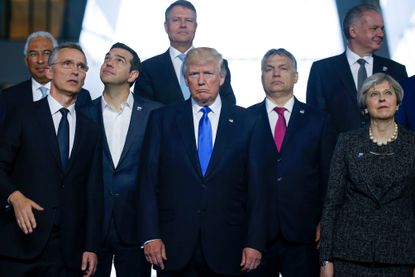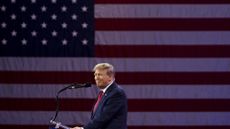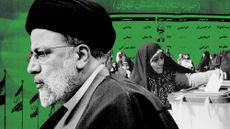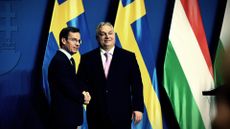The pitiful peacocking of Trump's Paris decision
The Paris climate deal doesn't actually do much. So why is Trump willing to sacrifice so much to destroy it?


President Trump is reportedly ready to pull out of the Paris climate accord.
This is extraordinarily dumb on two levels: First and most obviously, there's the overwhelming need to do something about climate change, one of the gravest dangers mankind has ever faced. But recklessness from this White House shouldn't surprise at this point. What is surprising is the second way this is dumb: Trump gains absolutely nothing by it.
The international agreement, which was signed by every country on the planet save Nicaragua and Syria, is entirely voluntary. As Vox's David Roberts helpfully explains, this is precisely what set the Paris accord apart from previous international climate treaties. It imposes no binding targets. The United States gets to decide for itself how much carbon it's willing to reduce. Its only obligations are to set some target, and then update the international community on its progress every five years and explain its behavior. The whole point is to rely on voluntarism, transparency, peer pressure, and a healthy sense of shame to move countries to do something about their greenhouse gas emissions.
Subscribe to The Week
Escape your echo chamber. Get the facts behind the news, plus analysis from multiple perspectives.

Sign up for The Week's Free Newsletters
From our morning news briefing to a weekly Good News Newsletter, get the best of The Week delivered directly to your inbox.
From our morning news briefing to a weekly Good News Newsletter, get the best of The Week delivered directly to your inbox.
The Obama administration put in place all sorts of new regulations to meet America's Paris commitment. These run from vehicle emission standards to methane leak rules to sweeping and highly controversial carbon emission cuts for power plants. Being executive actions, some of these rules will be relatively easy for the Trump administration to undo. Others far less so. Dismantling the power plant regulation, for instance, will require years of legal wrangling and court battles that will almost certainly take longer than Trump's four-year term.
At best, exiting the Paris agreement might make it marginally more difficult for environmentalists to win a suit against the White House for scrapping Obama's power plant rule. Besides that, pulling out of the treaty lowers none of the legal hurdles the Trump administration faces in carrying out its agenda.
The point of withdrawal then isn't really about policy, but vanity. Trump is a peacock strutting his stuff.
The White House's internal debate over whether to stay in the Paris accord is reportedly split between the "globalists," like chief economic advisor Gary Cohn, and the "nationalists," like strategist Stephen Bannon. And I will be the first to acknowledge that the emotional and ideological investment that a lot of elites like Cohn place in international agreements often seems to far outstrip their usefulness. The European Union is a slow-rolling economic catastrophe. Our international security alliances seem to either rubber-stamp America's imperial blundering or completely fail to check it.
But "usefulness" is the key phrase. If you take the threat of climate change seriously (and you should) then a cooperative international framework is the only possible way to address it. The global ecosystem does not care one wit about international borders. China and Europe's carbon emissions can wreck America's coastal cities, upend our crop production, threaten our water supplies, and sabotage our economy whether we like it or not. Nor does the Trump administration's supposed preference for one-on-one bargaining between countries offer an alternative: Any network of bilateral agreements wide-ranging enough to meet the scale of the problem would be a Paris-like international compact by default. The "nationalist" opposition to international action on climate change — embodied by Bannon and, increasingly, by Trump himself — is as empty and symbolic as they think the "globalist" position is.
If America, the world's biggest historical contributor to the greenhouse gas problem, decides to shirk its duty to change, all those other countries will quite understandably ask why they should bother sacrificing as well. That's really the critical danger here.
Of course, that did not just become the danger when Trump turned on the Paris agreement. It became the danger the second he won the White House, precisely because of Paris' voluntary nature. As Roberts noted, America's first review under the agreement is coming up, and Trump is already planning on flipping the international community the bird. The White House's answer to most of the questions on its progress amounts to a single sentence: "The administration is reviewing existing policies and regulations in the context of a focus on strengthening U.S. economic growth and promoting jobs for American workers, and will not support policies or regulations that have adverse effects on energy independence and U.S. competitiveness."
At the same time, Trump's insecurity in the face of international contempt for his climate position isn't going anywhere. The Paris agreement gives structure and form to international peer pressure, and that's important. But that pressure won't dissipate just because Trump abandons the agreement: His administration will still have to meet regularly with world leaders and international institutions. Members of his team will have to continue explaining themselves to lobbyists, industry, think tanks, and activist groups. The press will continue asking questions and writing stories. And large swaths of the American electorate will continue to care deeply about climate change.
Ultimately, the Paris agreement crystallized a shift that was already happening: A critical mass of the world community was coming to view climate change as an existential crisis. The social forces set off by that agreement will remain whether or not it does.
More than anything, Trump cares about his reputation and needs to assuage his own bottomless sense of insecurity and desire for dominance. He promised on the campaign trail to cancel the Paris agreement and regularly called climate change a "hoax" — even insinuating that the point of the deception was "to make U.S. manufacturing non-competitive." Trump clearly views the moral obligations imposed by the issue of climate change as an unnecessary burden on the American economy. Given the way Trump regularly equates job creation with his own prowess, that makes them, by extension, an unnecessary burden on himself.
But if he thinks abandoning the Paris accord will finally allow him to freely display his feathers, he is likely badly mistaken.
Sign up for Today's Best Articles in your inbox
A free daily email with the biggest news stories of the day – and the best features from TheWeek.com
Jeff Spross was the economics and business correspondent at TheWeek.com. He was previously a reporter at ThinkProgress.
-
 Can AI tools be used to Hollywood's advantage?
Can AI tools be used to Hollywood's advantage?Talking Points It makes some aspects of the industry faster and cheaper. It will also put many people in the entertainment world out of work
By Anya Jaremko-Greenwold, The Week US Published
-
 'Paraguay has found itself in a key position'
'Paraguay has found itself in a key position'Instant Opinion Opinion, comment and editorials of the day
By Justin Klawans, The Week US Published
-
 Meet Youngmi Mayer, the renegade comedian whose frank new memoir is a blitzkrieg to the genre
Meet Youngmi Mayer, the renegade comedian whose frank new memoir is a blitzkrieg to the genreThe Week Recommends 'I'm Laughing Because I'm Crying' details a biracial life on the margins, with humor as salving grace
By Scott Hocker, The Week US Published
-
 Has the Taliban banned women from speaking?
Has the Taliban banned women from speaking?Today's Big Question 'Rambling' message about 'bizarre' restriction joins series of recent decrees that amount to silencing of Afghanistan's women
By Harriet Marsden, The Week UK Published
-
 Cuba's energy crisis
Cuba's energy crisisThe Explainer Already beset by a host of issues, the island nation is struggling with nationwide blackouts
By Rebekah Evans, The Week UK Published
-
 Putin's fixation with shamans
Putin's fixation with shamansUnder the Radar Secretive Russian leader, said to be fascinated with occult and pagan rituals, allegedly asked for blessing over nuclear weapons
By Harriet Marsden, The Week UK Published
-
 Chimpanzees are dying of human diseases
Chimpanzees are dying of human diseasesUnder the radar Great apes are vulnerable to human pathogens thanks to genetic similarity, increased contact and no immunity
By Harriet Marsden, The Week UK Published
-
 Deaths of Jesse Baird and Luke Davies hang over Sydney's Mardi Gras
Deaths of Jesse Baird and Luke Davies hang over Sydney's Mardi GrasThe Explainer Police officer, the former partner of TV presenter victim, charged with two counts of murder after turning himself in
By Austin Chen, The Week UK Published
-
 Quiz of The Week: 24 February - 1 March
Quiz of The Week: 24 February - 1 MarchPuzzles and Quizzes Have you been paying attention to The Week's news?
By Sorcha Bradley, The Week UK Published
-
 Will mounting discontent affect Iran election?
Will mounting discontent affect Iran election?Today's Big Question Low turnout is expected in poll seen as crucial test for Tehran's leadership
By Sorcha Bradley, The Week UK Published
-
 Sweden clears final NATO hurdle with Hungary vote
Sweden clears final NATO hurdle with Hungary voteSpeed Read Hungary's parliament overwhelmingly approved Sweden's accession to NATO
By Peter Weber, The Week US Published